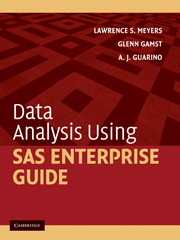Book contents
- Frontmatter
- Contents
- Preface
- Acknowledgments
- I Introducing SAS Enterprise Guide
- II Performing Analyses and Viewing Output
- III Manipulating Data
- IV Describing Data
- 8 Descriptive Statistics
- 9 Graphing Data
- 10 Standardizing Variables Based on the Sample Data
- 11 Standardizing Variables Based on Existing Norms
- V Score Distribution Assumptions
- VI Correlation and Prediction
- VII Comparing Means: The t Test
- VIII Comparing Means: ANOVA
- IX Nonparametric Procedures
- X Advanced ANOVA Techniques
- XI Analysis of Structure
- References
- Author Index
- Subject Index
10 - Standardizing Variables Based on the Sample Data
Published online by Cambridge University Press: 05 June 2012
- Frontmatter
- Contents
- Preface
- Acknowledgments
- I Introducing SAS Enterprise Guide
- II Performing Analyses and Viewing Output
- III Manipulating Data
- IV Describing Data
- 8 Descriptive Statistics
- 9 Graphing Data
- 10 Standardizing Variables Based on the Sample Data
- 11 Standardizing Variables Based on Existing Norms
- V Score Distribution Assumptions
- VI Correlation and Prediction
- VII Comparing Means: The t Test
- VIII Comparing Means: ANOVA
- IX Nonparametric Procedures
- X Advanced ANOVA Techniques
- XI Analysis of Structure
- References
- Author Index
- Subject Index
Summary
Overview
General meaning of standardizing
To standardize a variable is to transform the obtained values of a variable in such a way that we can immediately determine the following two features of any score: first, its position with respect to the mean, which is whether the score is below or above the mean of the distribution; second, the magnitude of its distance from the mean, which is how far from the mean the score falls in terms of standard deviation units (i.e., how many standard deviation units separate the score from the mean of the distribution). We do this because it is often the case that such information is not always apparent from a raw score.
Conveying direction
Direction is signified by standard scores because the value of the mean is set (transformed) to a known, fixed, arbitrary value. Three examples of commonly used standardized scores and their known or fixed means are as follows:
z scores have a mean of 0. Negative z scores are below the mean and positive ones are above the mean.
Linear T scores have a mean of 50. Linear T scores lower than 50 are below the mean and linear T scores higher than 50 are above the mean.
Intelligence test scores – the Wechsler Intelligence Test for Children (WISC) is a good example – commonly have a mean of 100. Scores lower than 100 are below the mean and those higher than 100 are above the mean.
Information
- Type
- Chapter
- Information
- Data Analysis Using SAS Enterprise Guide , pp. 104 - 110Publisher: Cambridge University PressPrint publication year: 2009
